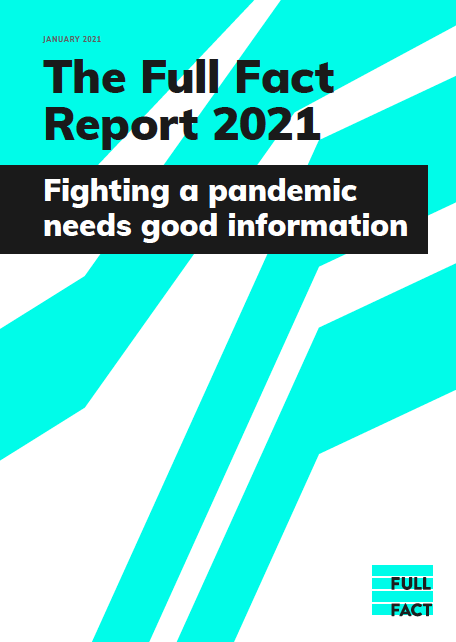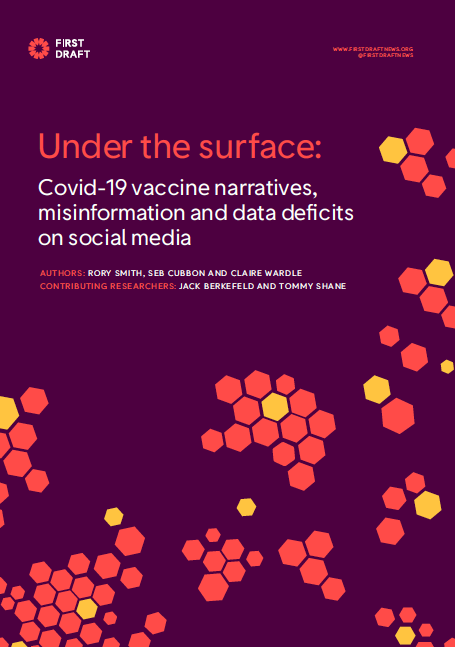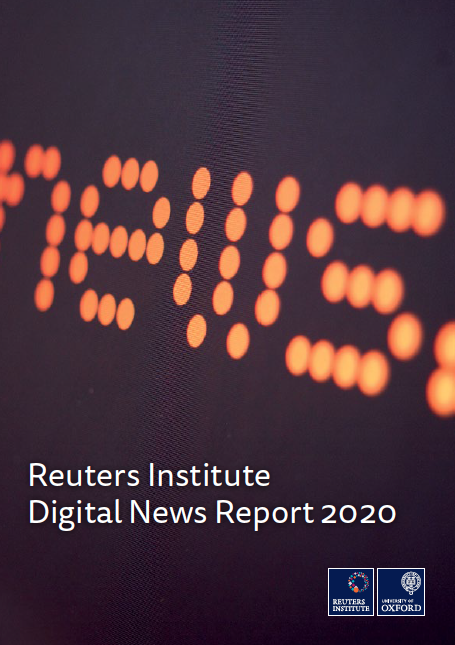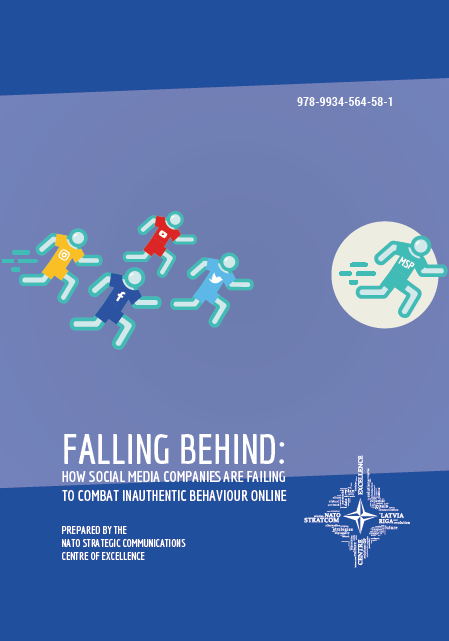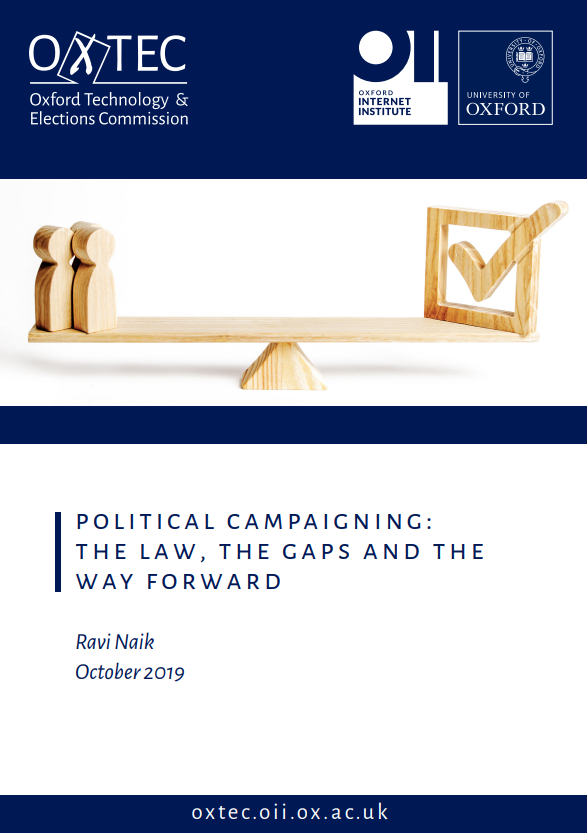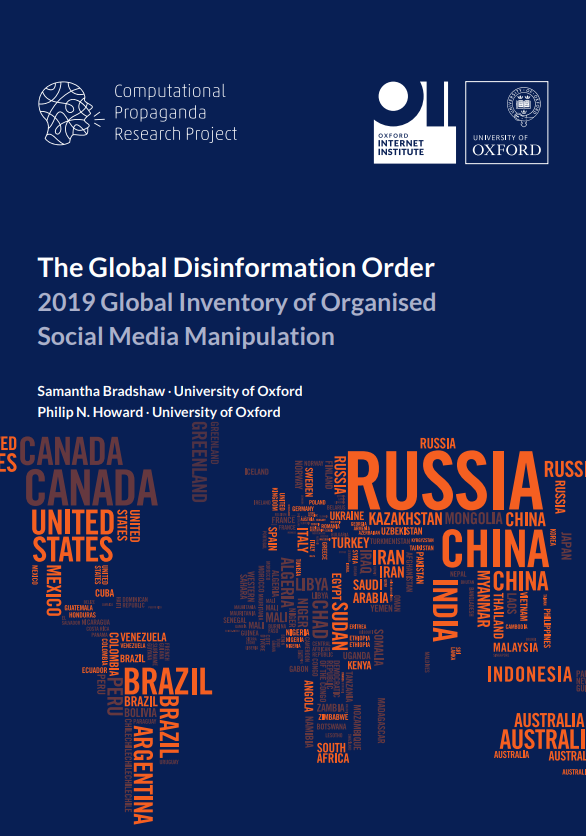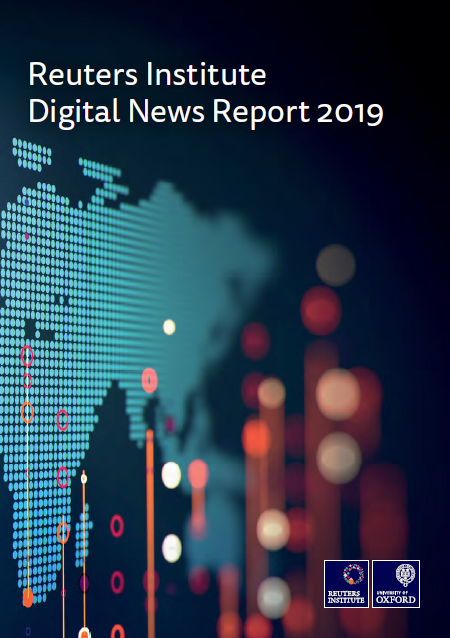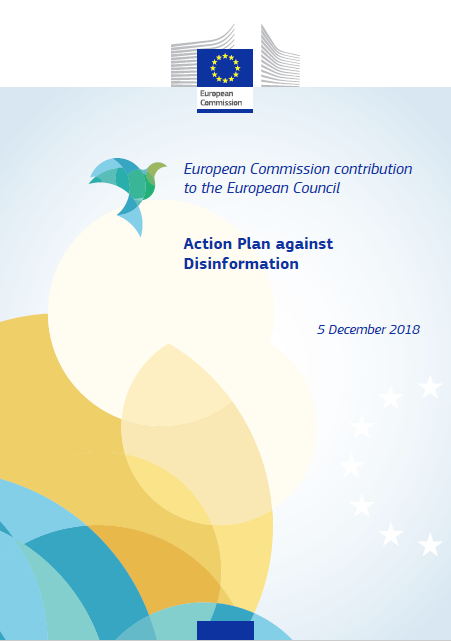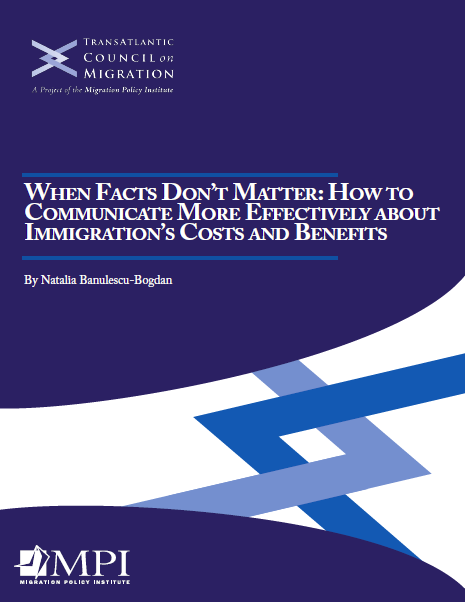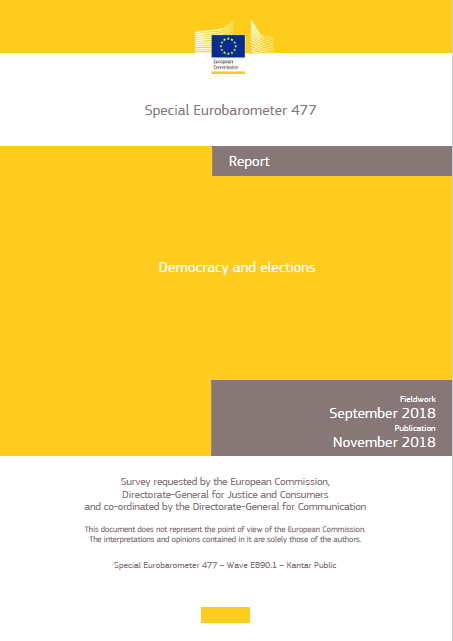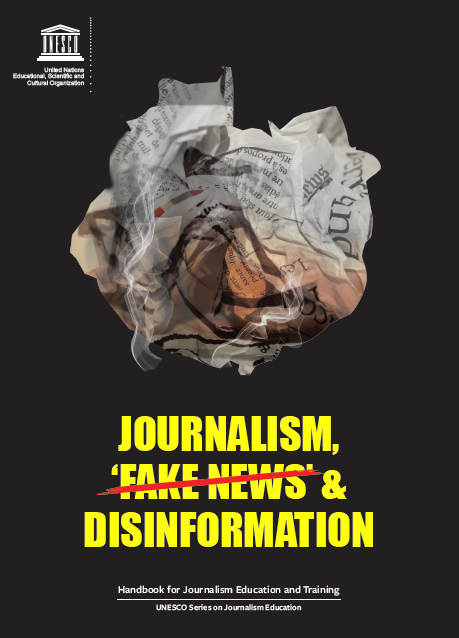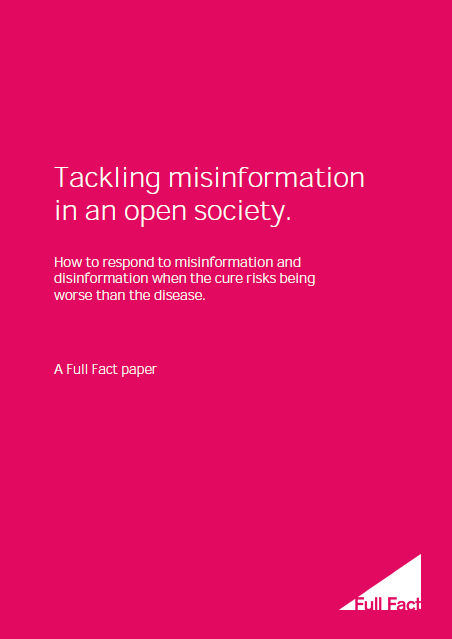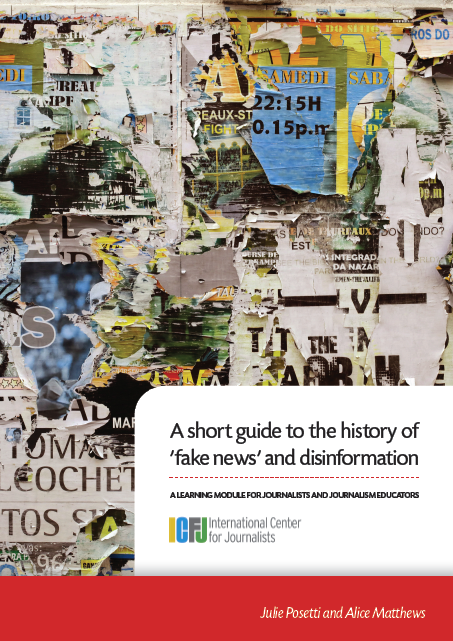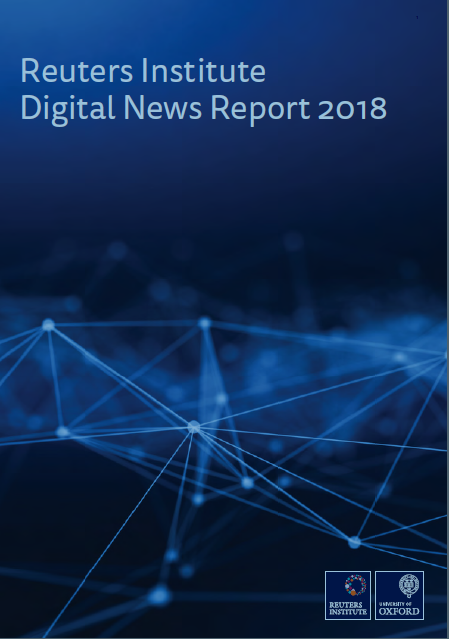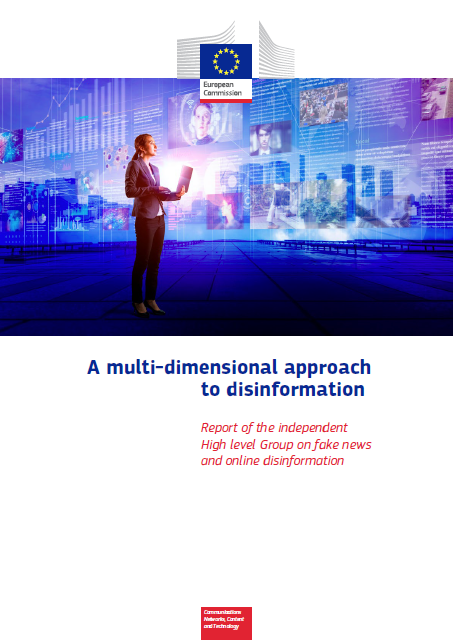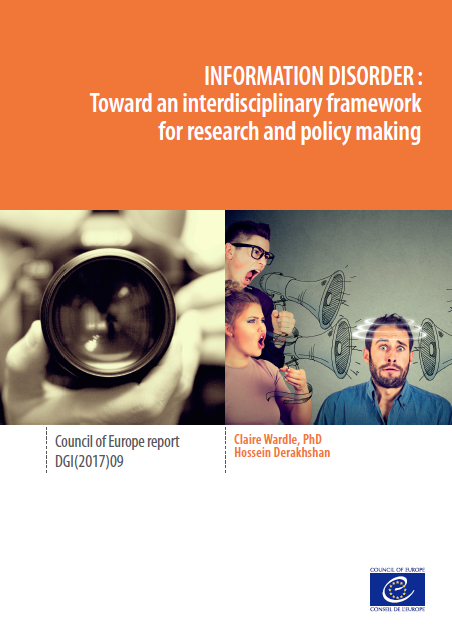External Publications
Fighting a pandemic needs good information
January 2021
Full Fact fights bad information. They do this in four main ways. They fact check claims made by politicians, public institutions, in the press and online. They then follow up on these, to stop and reduce the spread of specific claims. They campaign for systems changes to help make bad information rarer and less harmful, and advocate for higher standards in public debate.
This report considers how good information, communicated well, can benefit both individuals and society.
Under the surface: Covid-19 vaccine narratives, misinformation and data deficits on social media
November 2020
This research demonstrates the complexity of the vaccine information ecosystem, where a cacophony of voices and narratives have coalesced to create an environment of extreme uncertainty. Two topics are driving a large proportion of the current global vaccine discourse, especially around a Covid-19 vaccine: the “political and economic motives” of actors and institutions involved in vaccine development and the “safety, efficacy and necessity” concerns around vaccines.
Narratives challenging the safety of vaccines have been perennial players in the online vaccine debate. Yet this research shows that narratives related to mistrust in the intentions of institutions and key figures surrounding vaccines are now driving as much of the online conversation and vaccine skepticism as safety concerns.
Digital News Report 2020
June 2020
This year’s report reveals new insights about digital news consumption based on a YouGov survey of over 80,000 online news consumers in 40 markets including Kenya and the Philippines for the first time.
The report looks at the impact of coronavirus on news consumption and on the economic prospects for publishers. It looks at progress on new paid online business models, trust and misinformation, partisanship and populism, and the popularity of curated editorial products like podcasts and email newsletters.
How Social Media Companies are Failing to Combat Inauthentic Behaviour Online
November 2019
From the 2014 invasion of Ukraine to more recent attempts to interfere in democratic elections, antagonists seeking to influence their adversaries have turned to social media manipulation.
This report provides an assesment of social media company ability to respond to inauithentic bahaviour online and is based on an experiment that was conducted May-August 2019.
OxTEC: Political campaigning – the law, the gaps and the way forward
October 2019
This OxTEC report by Ravi Naik looks into the legal framework surrounding digital political campaigning and the current regulatory gaps in this area. The report also sets out a series of future recommendations for policymakers designed to improve the regulation of political campaigning in the digital age.
OxTEC was formed by an alliance of stakeholders, including ComProp, to “explore how democracies can integrate democratic norms and practices into the use of information technologies, social media, and big data during campaigns, with the goal of protecting the integrity of elections.”
The Global Disinformation Order
September 2019
Over the past three years, the Computational Propaganda Project has monitored the global organization of social media manipulation by governments and political parties. Their 2019 report analyses the trends of computational propaganda and the evolving tools, capacities, strategies, and resources.
Digital News Report 2019
June 2019
Journalism exists in the context of its audience, and if journalists (and those who care about journalism) are to understand and navigate the changing environment around news, it is critically important that they have access to relevant, robust, independent evidence and analysis on how people across countries engage with and use news. The eighth annual iteration of the Reuters Institute Digital News Report provides important new insights into key issues including people’s willingness to pay for news, the move to private messaging applications and groups, and how people see news media around the world performing their role.
The report is based on a survey of more than 75,000 people in 38 markets, along with additional qualitative research, which together make it the most comprehensive ongoing comparative study of news consumption in the world.
Action Plan Against Disinformation
December 2018
This Action Plan answers the European Council’s call for measures to “protect the Union’s democratic systems and combat disinformation, including in the context of the upcoming European elections”. It builds on existing Commission initiatives and the work of the East Strategic Communication Task Force of the European External Action Service. It sets out actions to be taken by the Commission and the High Representative, with the assistance of the European External Action Service, in cooperation with Member States and the European Parliament.
This Plan includes input received from Member States, including via discussions at Council in Permanent Representatives Committees I and II, the Political Security Committee, relevant Council working parties and meetings of strategic communication and political directors of Ministries of Foreign Affairs. It also takes into account the cooperation with the Union’s key partners, including the North Atlantic Treaty Organization and the Group of 7 (G7).
When Facts Don’t Matter
November 2018
At a time when people have more information at their fingertips than ever, it feels as though it has become equally easy to share it widely or to ignore, discount, and discredit it. Several factors have contributed to this state of affairs. New technologies have given a platform to a wider range of voices, but this has also meant that unvetted information and politically motivated “fake news” find their way more easily into the bloodstream of public debate. Human nature also shapes how people consume and recall information, making them more likely to resist information that contradicts their existing beliefs and personal experiences.
Special Eurobarometer – Democracy & Elections
November 2018
Democracy is a fundamental principle of the European Union. It is expressed in many ways in how the Union institutions work, not only by the rights of Member States to vote on issues, but also by the rights of citizens to directly elect members of the European Parliament to represent them. This representation, as well as citizens’ participation in decision making are key elements of democracy in the EU.
The importance of representation and participation, through free and fair elections and an open, informed and plural political debate represents the cornerstones of a functioning democracy.
This survey was commissioned by the Directorate-General for Justice and Consumers to explore citizens’ opinions and concerns about voting and elections, as well as their satisfaction with various aspects of democracy in the EU.
Journalism & Disinformation
October 2018
UNESCO works to strengthen journalism education, and this publication is the latest offering in a line of cutting-edge knowledge resources.
In this publication, disinformation is generally used to refer to deliberate (often orchestrated) attempts to confuse or manipulate people through delivering dishonest information to them. This is often combined with parallel and intersecting communications strategies and a suite of other tactics like hacking or compromising of persons. Misinformation is generally used to refer to misleading information created or disseminated without manipulative or malicious intent. Both are problems for society, but disinformation is particularly dangerous because it is frequently organised, well resourced, and reinforced by automated technology.
This handbook therefore is a call to action. It is also an encouragement for journalists to engage in societal dialogue about how people at large decide on credibility and why some of them share unverified information. As with the news media, for journalism schools and their students, along with media trainers and their learners, this is a major opportunity for strong civic engagement with audiences.
Tackling Misinformation in an Open Society
October 2018
This paper by Full Fact sets out a framework for a risk-based and proportionate response to the problems of misinformation and disinformation in the UK. The realistic goal is not to eliminate misinformation and disinformation, but is to build resilience against it.
They argue that immediate action is needed to tackle some urgent problems notably our outdated election law. But they also argue that rushing to come up with quick solutions to the range of issues could do more harm than good. We need to understand the wider issues clearly and design effective and proportionate solutions. Globally, some governments have pressed the panic button, leading them to come up with rushed, dangerous, and illiberal proposals. So far the UK has not. We should continue to try to work out how an open democratic society can tackle misinformation and disinformation while protecting free speech.
News in social media and messaging apps
September 2018
The Reuters Institute for the Study of Journalism (RISJ), at the University of Oxford, commissioned exploratory research from Kantar Media to provide a topical supplement to the Digital News Report 2018.
The aim of the research was to provide a qualitative exploration of consumer behaviour, attitudes and motivations surrounding news consumption in social networks and messaging apps, and the pivot away from news in Facebook.
A short guide to the history of ’fake news’ and disinformation
July 2018
Misinformation, disinformation and propaganda have been features of human communication since at least the Roman times when Antony met Cleopatra. Octavian waged a propaganda campaign against Antony that was designed to smear his reputation. This took the form of “short, sharp slogans written upon coins in the style of archaic Tweets.” These slogans painted Antony as a womaniser and a drunk, implying he had become Cleopatra’s puppet, having been corrupted by his affair with her. Octavian became Augustus, the first Roman Emperor and “fake news had allowed Octavian to hack the republican system once and for all.”
This learning module designed to be used by journalists, journalism trainers and educators (along with their students) provides historical context for the analysis of the 21st century ‘fake news’ crisis. Relevant case studies and a timeline are designed to better inform users about
the causes and consequences of ‘information disorder’.
Digital News Report 2018
June 2018
Reuters Institute’s seventh annual report explores the changing environment around news across countries. The report is based on a survey of more than 74,000 people in 37 markets, along with additional qualitative research, which together make it the most comprehensive ongoing comparative study of news consumption in the world.
Europe remains a key focus, where the report covers 25 countries including Bulgaria for the first time this year, but they also cover six markets in Asia (Japan, South Korea, Taiwan, Hong Kong, Malaysia, and Singapore) along with four Latin American countries (Brazil, Argentina, Chile, and Mexico) and the United States and Canada from North America.
Combating Misinformation
April 2018
The International Council for Information Technology in Government Administration (ICA), the Organization for Economic Co-operation and Development (OECD), eGovlab at Stockholm University and the Open University have worked together to address the impact that the revolutionized availability of information on the Internet, has on public discourse.
Pillar 1 of the OECD’s Recommendation on Digital Government Strategies on the need for national governments to create an inclusive, transparent and accountable digital sphere has been used as the initial guideline. From then on and in view of recent developments regarding digital disruption through misinformation, the main challenges and potential solutions for governments and citizens are examined.
This is an issue which has implications for public order and democracy and therefore it is established that governments have the ultimate responsibility and ability to deal with the causes and consequences of misinformation. This paper argues that they also have the ability to fill the key area between non-profit organisations (such as fact-checkers) and the private sector (social media platforms) and involve citizens to a greater level. So, what actions should governments take to fill that crucial space?
A Multi-dimensional Approach to Disinformation
March 2018
The analysis presented in this Report by the EU High Level Group on Disinformation starts from a shared understanding of disinformation as a phenomenon that goes well beyond the term «fake news». This term has been appropriated and used misleadingly by powerful actors to dismiss coverage that is simply found disagreeable.
Disinformation as defined in this Report includes all forms of false, inaccurate, or misleading information designed, presented and promoted to intentionally cause public harm or for profit. It does not cover issues arising from the creation and dissemination online of illegal content (notably defamation, hate speech, incitement to violence), which are subject to regulatory remedies under EU or national laws. Nor does it cover other forms of deliberate but not misleading distortions of facts such a satire and parody.
Information Disorder
September 2017
This report is an attempt to comprehensively examine information disorder and its related challenges, such as filter bubbles and echo chambers. While the historical impact of rumours and fabricated content have been well documented, we argue that contemporary social
technology means that we are witnessing something new: information pollution at a global scale; a complex web of motivations for creating, disseminating and consuming these ‘polluted’ messages; a myriad of content types and techniques for amplifying content; innumerable platforms hosting and reproducing this content; and breakneck speeds of communication between trusted peers.
The direct and indirect impacts of information pollution are difficult to quantify. We’re only at the earliest of stages of understanding their implications. Since the results of the ‘Brexit’ vote in the UK, Donald Trump’s victory in the US and Kenya’s recent decision to nullify its national election result, there has been much discussion of how information disorder is influencing democracies. More concerning, however, are the long-term implications of dis-information campaigns designed specifically to sow mistrust and confusion and to sharpen existing sociocultural divisions using nationalistic, ethnic, racial and religious tensions.
Subscribe to our newsletter
Get our latest project updates, news and events announcements first!

Co-inform project is co-funded by Horizon 2020 – the Framework Programme for Research and Innovation (2014-2020)
H2020-SC6-CO-CREATION-2016-2017 (CO-CREATION FOR GROWTH AND INCLUSION)
Type of action: RIA (Research and Innovation action)
Proposal number: 770302

